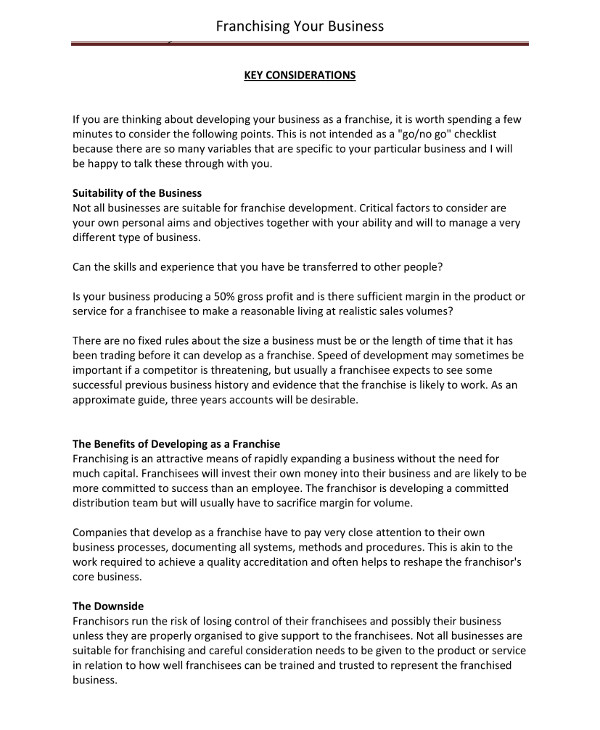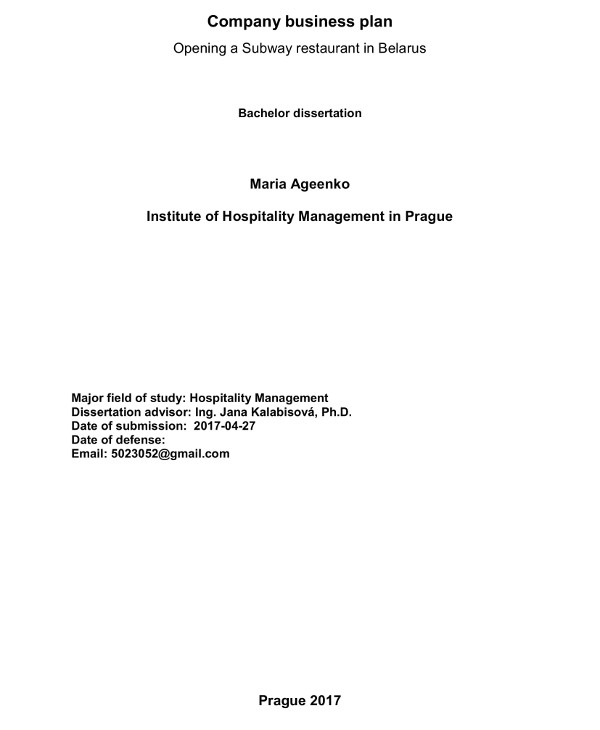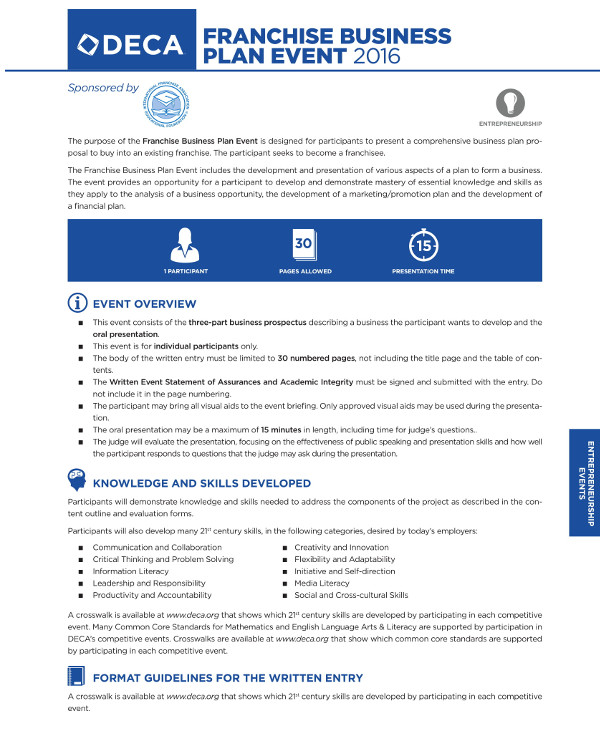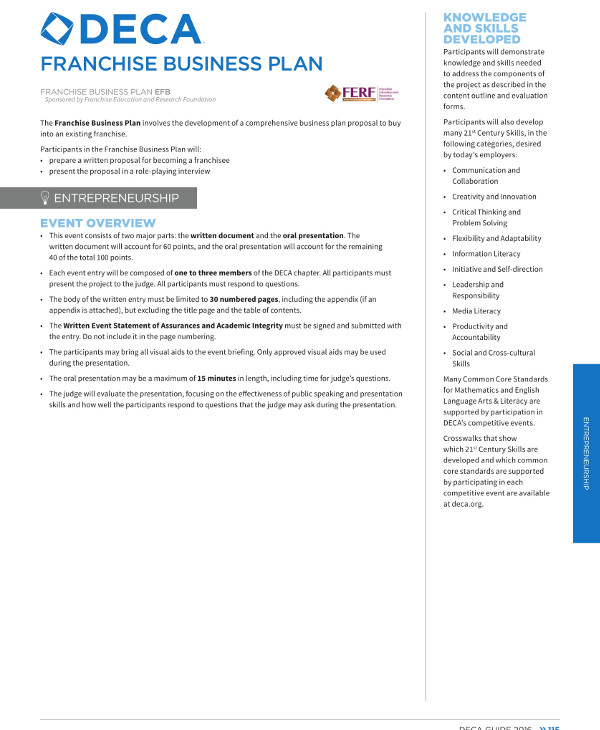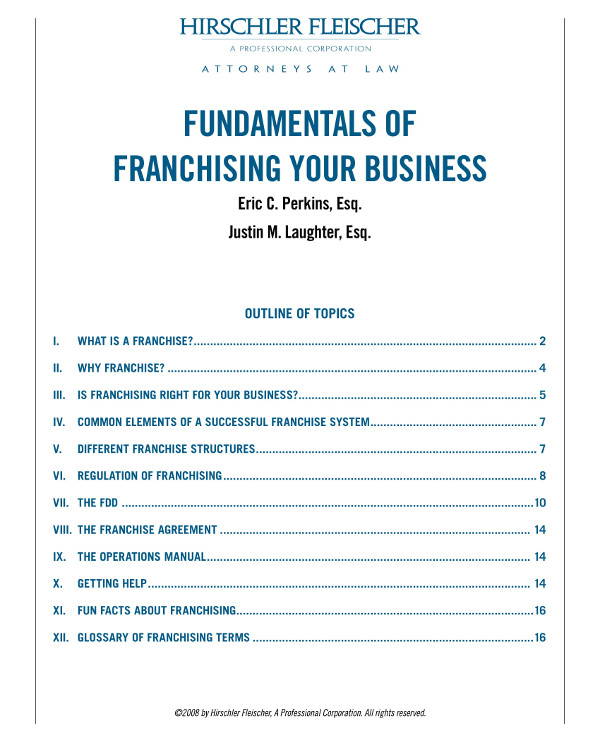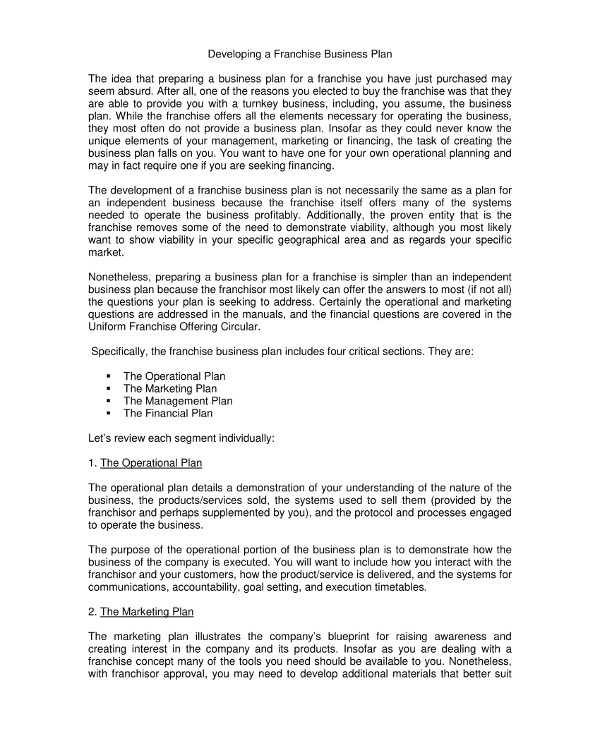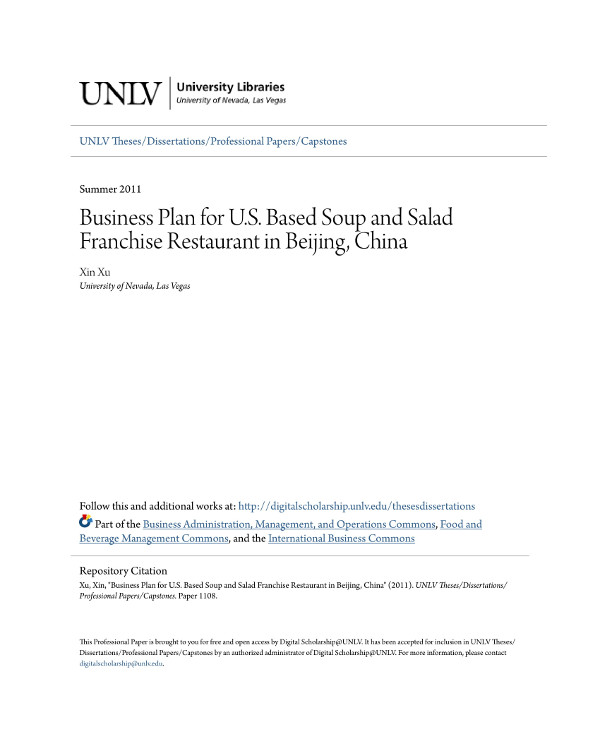9+ Franchise Business Plan Examples to Download
What is your initial plan when you have just franchised a business? Most people would find it absurd to immediately prepare a business plan for their franchise. Many would think that when you franchise, the franchisor would provide them the business plan apart from other elements necessary to operate the business. However, that is not the case. The task of creating a business plan for your franchise heavily falls on you. You have to note that developing a franchise business plan is not necessarily similar to the business plan of independent businesses.
It is much simpler because, most likely, the franchisor can provide the answers to most of the questions that your business plan is seeking to address. Hence, creating a franchise business plan does not really require tough brainstorming, planning, and preparation. Although you still need to be specific in your goals as a franchise, the franchisor can provide you the information regarding your target market, the suitable location for your business, and many other basic information.You may also see advertising and marketing business plan examples.
Franchise Marketing Plan Template

Do not be too overwhelmed with the thought of creating a successful business plan and instead focus on what you can do and what you can ask from your franchisor. Moreover, the examples of franchise business plan displayed below can surely help you in your start-up.
Banking Franchise Business Plan Example
Basics in Franchise Business Plan Example
Company Franchise Business Plan Example
Franchise Definition
By the book, a franchise is a method of parceling out goods or service. It is a type of business where the franchisee agrees to pay certain fees as well as follow certain business franchise rules in order to acquire the right to sell the goods or services of the franchisor, the company who established the company. The franchisee can also benefit from its business methods, trade secrets, goodwill, professional training, as well as operating assistance.You may also see company plan examples.
Popular Franchises
As we all know, many people love franchising business because the franchisor does not need to do hands-on on the operations because it has a lot of franchisees who can do the actual selling. Although they can operate a business on their own, they do not bear the hassle of opening branches to the different parts of the world. In fact, it is the franchisee’s task to disseminate the business in different areas.You may also see restaurant operational plan examples
On the other hand, it would be less bothersome for the franchisees to open up a business when they do franchising because they already have the basic requirements for a start-up from the franchisor. They only need to pay the fees, get some professional training, and adhere to the rules and immediately operate. The risk of losing is also low.You may also see business proposal letter examples
Hence, no wonder why there are a lot of franchising businesses today which are evidenced by the following companies:
1. McDonald’s
2. KFC
3. Burger King
4. Pizza Hut
5. 7 Eleven
6. Marriott International
7. RE/MAX
8. Dunkin’ Donuts
9. InterContinental Hotels and Resorts
10. SUBWAY®
11. Baskin-Robbins
12. Domino’s Pizza
13. Taco Bell
14. Ace Hardware Corporation
15. Jani-King Commercial Cleaning Services
16. Wyndham Hotels and Resorts
17. Hertz
18. Carrefour
19. Europcar
20. Choice Hotels
Comprehensive Franchise Business Plan Example
Detailed Franchise Business Plan Example
Entrepreneurship Business Plan Example
Elements of a Franchise
A franchise, for it to operate legally, consists of the following three elements: trademark, fee, and control or assistance.
Trademark
Under the trademark of the franchisor, the franchisee must operate his business in providing goods or services. For example, when you are franchising Ace Hardware Corporation, you do not need to make your own company name as you are adopting the company name of the franchisor. Hence, in your operations, you must bear the name Ace Hardware Corporation.You may also see restaurant strategic plan examples
Fee
There are certain franchise fees associated to the franchise which is a requirement and a condition for you to obtain the franchise and begin the operation. While the franchise fees are payment for the trademark and other benefits that a franchisee acquire from the franchisor, some franchisors would use the fee to aid in the start-up materials and tools of the franchisee.
Control or Assistance
Another element of a franchise is that, although the franchisee is running the business through his or her own operations, the franchisee is still subject to various requirements that are imposed by the franchisor. These include requirements regarding the location of the business, the design of the site as well as the appearance of the store, hours of operation, sales methods, marketing, as well as management systems.You may also see business plan guidelines examples
Key Considerations
If you are still new to franchise, you need to know and understand the basics in franchising for you to easily perform franchising operations. There are some points to consider when you are in a franchise business, and these are as follows:
1. Business Suitability
One of the critical factors that you must consider is the suitability of your business. This includes your personal aims, your objectives, as well as your ability and will to manage this type of business—franchising.
2. Benefits
Another thing that you must consider in franchising is the benefit that you can acquire from the franchise. Although most of the franchise have a low risk of not being profitable, there are some franchise that would provide you very less returns.You may also see tutoring business plan examples
3. The Downside
You must also consider the downside of franchising. For the franchisor, he or she must carefully assess the franchisee regarding the ways they can be trained and controlled. For the franchisee, he or she must scrutinize the legitimacy of the business.
4. Franchisor’s Life
Know that if you are a franchisor, it is your responsibility to manage the initial period of the franchise as well as to train the franchisee. He or she must also ensure to keep the franchisee interested in their business through launching and introducing new products and services.You may also see farm business plan examples
5. Corporate Image
Franchisees can benefit from a strong corporate image of the franchisor. The franchisor must be legal and registered, and if the franchisor has a trademark, it must be registered with the Patent Office.
6. Legal Agreement
There must be an agreement signed before the commencement of the franchise or start of the franchise operations. There must also be an agreement as to who will shoulder the legal costs, whether it may be the franchisor or the franchisee. For this, you might want to take a look at franchise agreements.
7. Financial Matters
Another important consideration is the financial aspect of the franchisor. The franchisee would normally expect that there is transparency in the financial statements of the franchisor and that the accounting records involve positive amounts.
8. Testing
The franchise products or services must be carefully tested in the market with a pilot franchise and an independent franchisee for a certain period of time, usually over a minimum of twelve months to ensure that the franchise is not a failure.You may also see risk plan examples.
9. Operating Areas
In order to find the optimum area of the franchise, where it is conducive to the target market, a research must be carried out to define a certain location that will support the business based on the number of people, number of households, number of businesses, number of cars, etc. You might also be interested in rental property business plan.
10. Franchise Package
The franchise must provide the franchisor the benefit of the franchise even at the commencement of the franchise through providing a package of a fair amount of initial stock, training, manuals, accounting system, and other necessities for a start-up. For reference, you can check out tech startup business plans.
11. Brand Security
As has been said above, the patent or trademark of the franchisor must be registered with the Patent Office. This will cover the protection for the business name and the logo of the business. This will also ensure the franchisee that the business he or she is into is not only credible but also safe and secured.
12. Company Structure
The structure of the company who serves as a franchisor must also be taken into consideration. This will enable the franchisee to understand more about the business that he or she is into.You may also see convenience store business plan examples
Franchising Business Plan Fundamentals
Sefa Franchise Business Plan Outline Checklist Example
Short Franchise Business Plan Example
Soup and Salad Franchise Restaurant Business Plan Example
Sections of a Franchise Business Plan
If you have already started in your franchise, one of the first things that you must have is a business plan. Although you might think that the resources and basic provided by the franchisor is enough, well, it is really not. You must have your own business plan that will detail your plans as well as the detailed steps in achieving those plans.
In your business plan, you must include these important section for it to be comprehensive and detailed:
1. Operational Plan
In your operational plan, it must contain information demonstrating your understanding of the nature of the business, the products and services for sales, the systems and methods used in selling, as well as the processes engaged to operate the business.
Operational plan is important in order to demonstrate how the business is executed. Also include your ways in interacting the customers, the delivery of the products or services, the systems for communication, execution timetables, among others.
2. Marketing Plan
In this section of your business plan, you must illustrate the company’s blueprint in order to create interest not only in the company but also its products. Normally, the franchisor would provide you advertising materials for your marketing. However, you may also need to develop additional advertising materials that better suits in the area where you are doing business.
The importance of marketing plan is that it is used to map out how to engage the market and sustain customer flow. You must include in your marketing plan the description of your target market, the channels for communication, marketing strategies, and many other plans related to marketing.
3. Management Plan
In your management plan, you must include the management—the people who set the strategies, oversee and execute, allocate the resources, and make the decisions—as well as the company’s vision and philosophy. Normally, the franchisor already has this in their company documents, but you can contribute in enhancing and improving their management plan through creating your own relevant management plan. This is integrating your own vision for your franchise to the management plan that they have already created.
This is important because it provides evidence of competency and management systems. Hence, relevant sections from the franchise management manual, tactical positions, strategic principles, and prevailing business models must also be included in this section of your business plan.
4. Financial Plan
Your financial plan is your method of proving how your operations can make money in doing what it is supposed to do. You may include in your plan the financial successes of other franchises and of the franchisor’s own operations. This is to demonstrate your anticipated success in your franchise.
A financial plan is important in order to show the key elements of the company’s operation. Hence, it is recommended that you will include in your financial plan your operational budget, the funds that you need and expect to raise of borrow, as well as the anticipated costs and revenues in the form of projections.
Start Now!
If you are contemplating on venturing into franchise business, it is better that you start immediately and enjoy the benefits from your franchise. The earlier, the better. Remember, a franchising business provides lesser risk and you are assured of the return, especially when you are franchising a business that already established its name in the industry, for example, McDonald’s.You may also see lean business plan examples.
So what are you waiting for? Make the wise decision now, and use the examples of franchise business plan provided above to help you in your start-up. If you got to start some time, why not now?




